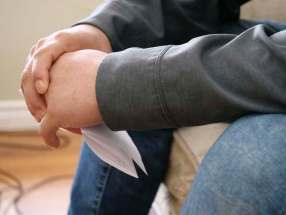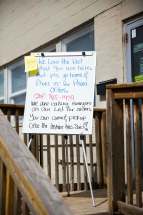Precarious employment, immigration situations force hard choices in pandemic
Read this article for free:
or
Already have an account? Log in here »
To continue reading, please subscribe:
Monthly Digital Subscription
$1 per week for 24 weeks*
- Enjoy unlimited reading on winnipegfreepress.com
- Read the E-Edition, our digital replica newspaper
- Access News Break, our award-winning app
- Play interactive puzzles
*Billed as $4 plus GST every four weeks. Offer only available to new and qualified returning subscribers. Cancel any time.
Read unlimited articles for free today:
or
Already have an account? Log in here »
Hey there, time traveller!
This article was published 15/04/2020 (1786 days ago), so information in it may no longer be current.
Mohammed felt the tightness in his chest, he was dazed and having a hard time breathing. He couldn’t stop sneezing.
“I was anxious I had COVID-19,” he said.
It was early April, and he faced a difficult choice. He was aware of the social-distancing and self-isolation protocols in place in Manitoba, but he knew if he didn’t go to work he wouldn’t get paid, and without a doctor’s note he wondered if he’d be fired. If he got fired, he worried that even his Canadian work permit could be on the line.
So he got ready, and headed to work at a Winnipeg gas station. (Mohammed’s full name is not being disclosed because he fears for his job and immigration status if the Free Press were to identify him.)
He found comfort in the fact he was working behind a newly-installed plexiglass shield. It wasn’t ideal, but he felt he had no other choice. The money he earns after paying for groceries and rent is sent to Bangladesh to care for his aging parents, who both rely on him. The stress has become overwhelming.
“I’m always worried about them (both at high risk for complications should they contract COVID-19), that I can’t take care of them. I should be there at this moment, but can’t in my financial situation,” he said.
“I’m always worried about (my parents), that I can’t take care of them. I should be there at this moment, but can’t in my financial situation.”
Mohammed called Health Links to find out how he should proceed. He told the Free Press after waiting on hold for two hours, the representative on the other end of the line advised he go for testing at the nearest emergency room — not one of the off-site coronavirus testing centres.
He went to the downtown Health Sciences Centre and was swabbed for COVID-19. He was handed a bill for $359. He has no idea where he’s going to come up with the cash to pay it.
“I already don’t save a penny for myself,” he said. “I could pay if it was a smaller amount. And I only took the test. I didn’t take any medicine or anything like that. It is a lot of money to me.”
Mohammed knows he’s not alone in this kind of situation and believes charging for testing could threaten the health of others who are in precarious immigration and employment situations. It also will dissuade people from getting tested, he said, which could have wider public health implications.
“I could pay if it was a smaller amount. And I only took the test. I didn’t take any medicine or anything like that. It is a lot of money to me.”
“If it’s someone in my situation, but they are positive for COVID-19, I worry they won’t get proper treatment if they’re charged for tests. Their life is at risk.”
A spokesperson for Manitoba Health was unable to provide an estimate for how many people have been charged for a COVID-19 test in the province, but said anyone who had questions about such billing should contact the patient inquiry phone line.
Mohammed’s test result came back within days: it was negative. It took some of the stress off, but he still faces the risk of daily interactions with the public as an essential worker in the midst of a pandemic.
“If it’s someone in my situation, but they are positive for COVID-19, I worry they won’t get proper treatment if they’re charged for tests. Their life is at risk.”
On Tuesday, the province announced there were new provisions being proposed to the Employment Standards Code that would guarantee employees time off if they needed to self-isolate or if they need to seek medical attention for testing or treatment. However, this time off would be unpaid.
“We want to reassure Manitobans they won’t lose their job for taking leave to comply with public health orders to self-isolate or to seek medical attention or care for a loved one because of COVID-19,” said Premier Brian Pallister.
“We all have a role to play in flattening COVID curve and we are committed to helping Manitobans navigate this challenging and unprecedented time.”
sarah.lawrynuik@freepress.mb.ca
Twitter: @SarahLawrynuik
History
Updated on Wednesday, April 15, 2020 9:16 PM CDT: Fixes typo





